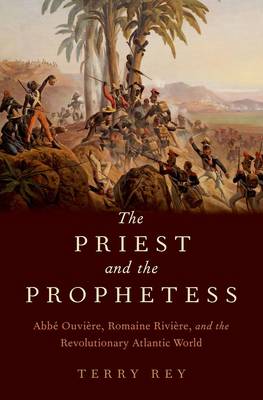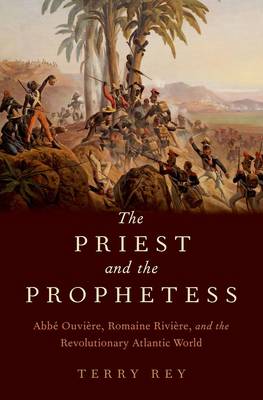
- Afhalen na 1 uur in een winkel met voorraad
- Gratis thuislevering in België vanaf € 30
- Ruim aanbod met 7 miljoen producten
- Afhalen na 1 uur in een winkel met voorraad
- Gratis thuislevering in België vanaf € 30
- Ruim aanbod met 7 miljoen producten
Priest and the Prophetess
ABBE Ouviere, Romaine Riviere, and the Revolutionary Atlantic World
Terry ReyOmschrijving
By 1791, the French Revolution had spread to Haiti, where slaves and free blacks alike had begun demanding civil rights guaranteed in the 1789 Declaration of the Rights of Man. Enter Romaine-la-Prophetesse, a free black Dominican coffee farmer who dressed in women's clothes and claimed that the Virgin Mary was his godmother. Inspired by mystical revelations from the Holy Mother, he amassed a large and volatile following of insurgents who would go on to sack countless plantations and conquer the coastal cities of Jacmel and Leogane.
For this brief period, Romaine counted as his political adviser the white French Catholic priest and physician Abbe Ouviere, a renaissance man of cunning politics who would go on to become a pioneering figure in early American science and medicine. Brought together by Catholicism and the turmoil of the revolutionary Atlantic, the priest and the prophetess would come to symbolize the enlightenment ideals of freedom and a more just social order in the eighteenth-century Caribbean.
Drawing on extensive archival research, Terry Rey offers a major contribution to our understanding of Catholic mysticism and traditional African religious practices at the time of the Haitian Revolution and reveals the significant ways in which religion and race intersected in the turbulence and triumphs of revolutionary France, Haiti, and early republican America.
Specificaties
Betrokkenen
- Auteur(s):
- Uitgeverij:
Inhoud
- Aantal bladzijden:
- 344
- Taal:
- Engels
Eigenschappen
- Productcode (EAN):
- 9780190625849
- Verschijningsdatum:
- 2/06/2017
- Uitvoering:
- Hardcover
- Formaat:
- Genaaid
- Afmetingen:
- 183 mm x 251 mm
- Gewicht:
- 657 g

Alleen bij Standaard Boekhandel
Beoordelingen
We publiceren alleen reviews die voldoen aan de voorwaarden voor reviews. Bekijk onze voorwaarden voor reviews.











